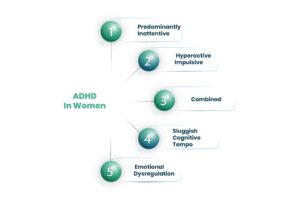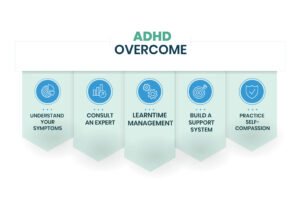Do you have problems with ADHD as a woman? If so, ADHD in women is misunderstood and not completely diagnosed, which makes many of them inquire why it is so difficult to concentrate, organize, and feel a bit more in control of their emotions. The symptoms of ADHD in women may be extremely different from those in men. They may involve forgetfulness, mood swings, constant disorganization, and the inability to engage in day-to-day chores.
These symptoms can be confused with stress or anxiety, which can also delay the accurate diagnosis and treatment. They should be identified at the earliest stage, and this will enable women to receive effective therapies, medication, and coping mechanisms, which address their needs as individuals. Through knowing the ADHD in women and the symptoms of ADHD that women show, women would be able to take their lives under control, become more productive, and develop better personal and professional relationships.
High-Functioning ADHD In Women
ADHD has high prevalence in women and, hence, it can go undetected because people do not always find it clear or can confuse it with stress/anxiety. This condition may make females seem organized and prosperous on the outside, but they are incapable of concentration and are impulsive. Similar to traditional ADHD symptoms, they can have problems such as emotional sensitivity, forgetfulness, and time management.
However, women with high-functioning ADHD may become successful through the provision of the right strategies and support. Additionally, maintaining good routines, using planners, and setting small goals can lead to equilibrium and efficiency. Also, participation in support groups or professional counseling is inspirational and offers helpful tips. With knowledge and support, women can cope with high-level ADHD and lead a more active life.
Signs Of ADHD In Women
Here are the symptoms of ADHD In Women:
- Losing keys, phones, and other important documents frequently.
- Loss of schedules and forgetting of activities despite reminders.
- Shopping sprees and impulsive relationships.
- Difficulty in relaxing or unwinding, even in free time.
- Initiates numerous projects, completes a few of them.
- Poor self-esteem because of consecutive failures.
- Unable to rank tasks and meet deadlines.
- Speaking to people without noticing.
What Causes ADHD In Women?
A complex of environmental factors, biological, and genetic causes causes ADHD in women. The impact of genetics is also rather high, i.e., it is apt to be familial. The differences in the brain may cause the emergence of symptoms, especially in the areas of the brain that control attention and self-control. The element of hormonal variations in life, at puberty, during pregnancy, or even menopause, may also contribute to the heightening of ADHD symptoms. The earlier this problem is recognized, the more women can cope with ADHD.
- Genetics and family history
- Variations in the brain in terms of attention.
- Childhood disaster, pressure, or trauma.
- Sleep disturbance or medical disorders.
- Prenatal environmental exposures.
- Social pressures and Multitasking requirements.
Types Of ADHD In Women

1. Predominantly Inattentive Type
The problems of women of this type are mostly with focus and attention. Their attention is easily drawn, and they forget as well as cannot structure their day-to-day activities. Every day duties can be intimidating. This kind is not always given attention due to the lack of hyperactivity.
2. Hyperactive-Impulsive Type
This type is characterized by predominantly hyperactivity and impulsive behavior. Women can be highly agitated, over-talkative, or unthoughtful. They may find it difficult to sit and wait. Impulsivity may have an impact on relationships and decisions.
3. Combined Type
Combined type entails inattention and hyperactivity-impulsivity. Women experience difficulty in concentration and also become restless or impulsive. It is a kind that may complicate or even make life a stressor. The symptoms differ in severity depending on the situation.
4. Sluggish Cognitive Tempo (SCT) Type
Daydreaming, mental fog, and slowness of processing appear in SCT, though not all guidelines explicitly mention it. Women may seem lazy or dreamy yet struggle with attention. It often accompanies anxiety or depression. Identifying it helps deliver the best treatment.
5. Emotional Dysregulation Type
Some women experience severe moods and emotions on top of the ADHD symptoms. They are easily irritated, nervous, and intimidated. The emotional dysregulation can affect work, relationships, and self-esteem. Addressing it is necessary to be in total control of ADHD.
How to Overcome ADHD in Young Women?

1.Understand Your Symptoms
It is the identification of the symptoms in young women that is the first step towards overcoming ADHD. Women have a lot of inattentiveness, restlessness, or mood swings that are often ignored. It is possible to act by tracking these patterns early. Moreover, you can know your limitations and find beneficial treatment and aid.
2.Consult an Expert
A professional diagnosis of ADHD is important for making a proper diagnosis. Psychiatrists or clinical psychologists can assess your symptoms and suggest individual strategies. The diagnosis also helps select the right medication or therapy. This is an action that will make sure that you are on a systematic course towards coping with ADHD.
3.Learn Time Management
Time management helps young women with ADHD stay organized. Planners, alarms, or apps break down tasks into manageable steps. In addition, the sequencing of tasks reduces the stress of the responsibilities and improves the output.
4.Build a Support System
The support or friendship groups, or family support, of ADHD patients should be facilitated. One of the solutions to this problem is to share experiences and help each other. Moreover, academic or work problems may be solved with the assistance of mentors or coaches. A good support system will make you have the drive to be uncompromising in treatment and self-care.
5.Practice Self-Compassion
Cure of ADHD is a prolonged process, which involves self-forgiveness. Grant, that thou should not fail, nor is it a definition of what thou competencies. Besides this, rewards for minor successes create trust and confidence. Self-compassion will help you establish a favorable demeanor that will help in your future success.
Treatment For ADHD In Women
1.ADHD in Women Test
The ADHD in Women Test is an initial step in understanding ADHD in women that helps to detect more or less familiar symptoms, including distractibility, emotional sensitivity, and forgetfulness. Early detection of these signs will help the women make a step towards effective treatment. Additionally, this test will enable medical professionals to develop a treatment plan so that they can provide women with the appropriate support according to their special needs.
2.ADHD Diagnosis in Women
Following testing, a comprehensive ADHD Diagnosis in Women validates the fact and establishes the diagnosis between this and other mental health demands. In the process, medical workers examine individual history, behavior patterns, and lifestyle considerations towards accuracy. Moreover, proper diagnosis enables women to know their strengths and weaknesses, which direct them to specific treatment opportunities.
3.Medication Management
The treatment of ADHD among women relies on medication management since it restores the balance of the brain chemicals that influence attention, impulsiveness, and the energy level in the body. Moreover, close monitoring and alteration of dosages will render long-term treatment of the illness safe and efficient. Thus, treatment and lifestyle change medication will provide women with an effective strategy that will enable them to manage ADHD.
4.CBT (Cognitive Behavior Therapy)
An appropriate therapy for women with ADHD is Cognitive Behavioral Therapy (CBT) because it is applied in the monitoring of the trends of dysfunctional thoughts. CBT also provides women with knowledge on practical methods of distraction management, minimization of procrastination, and emotion management. More so, this therapy improves self-understanding and problem-solving abilities, which are mandatory in everyday achievement.
End Note
A combination of interventions is capable of controlling ADHD among women, bearing in mind the diverse needs of women. A stimulant or non-stimulant drug assists in improving concentration, impulsivity, and mood. The behavioral therapy and cognitive-behavioral therapy (CBT) will be used in the development of organizational capabilities, time management, and coping strategies.
The dietary modifications, physical activities, and sleep are also important in the management of the symptoms. The group support and guidance can offer support and encouragement that would help the women to overcome the adversities of day-to-day life and enhance self-esteem. Learning about the triggers (i.e., hormones, stress) is also an important factor in reducing the symptoms and flare-ups. The Mental Behavioral is a source that you may trust to give you the correct information and guidance on the treatment of ADHD in women.
FAQs
What are the triggers for ADHD in women?
The following are the triggers of ADHD in women:
- High stress levels
- Lack of sleep
- Poor diet or nutrition
- Noisy or distracting environment
- Anxiety or depression
- Overwhelming multitasking demands
How is ADHD treated in women?
ADHD is a condition affecting women and is treated by medication, therapy, and changing their lifestyles. The behavioral therapy helps in the regulation of concentration and organization.
How to tell if your wife has ADHD?
Be aware of forgetfulness, lack of concentration, inability to focus, and inability to be organized, among other things. It can also take the form of emotional sensitivity or mood swing. A professional assessment is the best way to establish ADHD.
What is the negative perspective of ADHD in women?
The dark side lies in being chronically stressed, having low self-esteem, and having trouble with relationships. Anxiety, depression, and burnout are also possible among women as they are overcompensating every time.
At what age do females have ADHD?
ADHD symptoms are usual in the adolescent stage and in early adulthood. Gonadal hormonal variations, such as menstruation or pregnancy, exacerbate symptoms.








